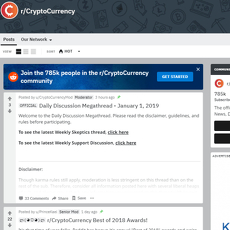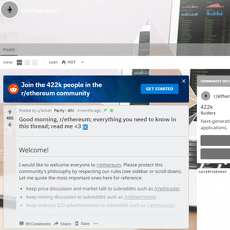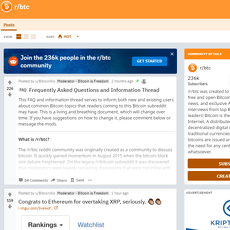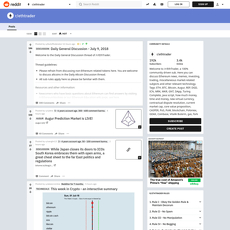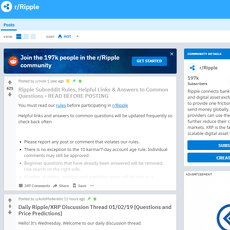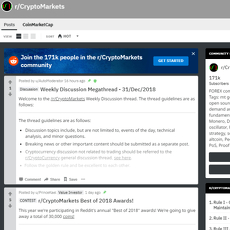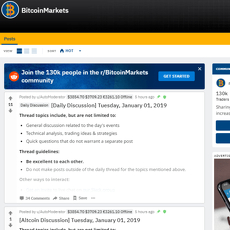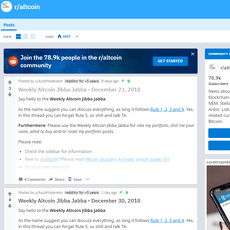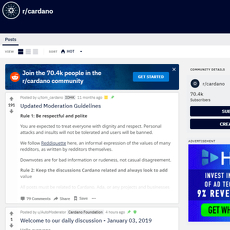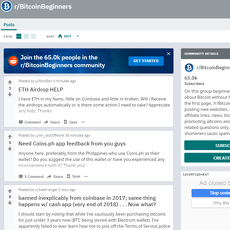r/litecoin Review
r/litecoin
www.reddit.com
r/Litecoin Review Guide: Everything You Need to Know + FAQ
Thinking about joining r/Litecoin but not sure if it’s actually useful—or just another time sink?
If you’ve ever opened a crypto subreddit and felt overwhelmed by price spam, recycled talking points, or comment wars, you’re not alone. Social feeds reward the loudest takes, not the most useful ones. In fact, research from MIT found false or sensational content spreads faster than the truth on social platforms—no surprise to anyone who’s scrolled a crypto thread on a volatile day. Source.
The problem with using r/Litecoin (and why most people give up fast)
Reddit can be fantastic for niche insights—but only if you know how to cut through the noise. Here’s what usually goes wrong when people try to learn from r/Litecoin:
- Price spam and low-effort shills: “LTC to $x by Friday!” posts that offer zero evidence.
- Recycled FUD and hot takes: Threads that debate the same “Is LTC dead?” angle without adding anything new.
- Credibility is unclear: It’s hard to tell who actually runs nodes, ships code, or uses LTC in the real world—and who’s just guessing.
- Scattered signal: Dev updates and real adoption news get buried under opinions, memes, and short-term price chatter.
- Missed resources: Newcomers don’t see the rules, megathreads, or simple filters that would make the sub dramatically better.
Quick example: A post with a bold claim like “Litecoin privacy is broken” might get traction with no sources. Meanwhile, a sober thread linking a Litecoin Core release note or a GitHub PR can sit unseen unless you know how to sort and search for it.
Here’s the plan
I’m going to show you how to use r/Litecoin the way power users do—fast, clean, and focused on what actually makes you smarter:
- Map the subreddit: Rules, flairs, and how posts get filtered or removed.
- Find the good stuff: The threads and formats that consistently deliver value (dev notes, network health, merchant usage, tutorials).
- Know who to pay attention to: Signals that a poster is credible—history, repos, data, and proof.
- Skip traps: Spot scams, off-site DM bait, and clicky predictions before they waste your time.
- Get answers fast: A no-fluff FAQ for the questions that keep popping up.
Who this guide is for
- Holders who want LTC ecosystem updates without camping on the subreddit all day.
- Miners tracking hashrate, halvings, fees, and sentiment.
- Merchants and payments folks looking for real-world tips and integrations that actually work.
- Researchers and builders who care about MWEB, Core releases, and credible sources.
- Curious readers who want signal over hype.
What I looked at to review r/Litecoin
I reviewed the subreddit like a product: not for entertainment, but for information quality and time efficiency.
- Post quality: Are there sources, data, screenshots, or code? Or is it just vibes?
- Moderation style: How quickly spam/scams get handled and how consistently rules are applied.
- Flair system: Whether tags like News, Dev, Price, and Help are used well enough to sort your feed.
- Megathreads and wiki: Are recurring threads and sidebars actually helpful, or just decoration?
- Engagement patterns: What gets upvoted and why—hype vs. substance.
- How news is handled: Does legit LTC news surface quickly, or get drowned out?
Quick verdict up front
r/Litecoin is strong for network updates, developer notes, and the community pulse—and weak for serious price analysis. If you know how to filter it, it’s a solid feed for staying plugged into Litecoin’s ecosystem.
- Where it shines: Practical posts on wallets, fees, and payments; links to Core releases and MWEB resources; early sightings of merchant adoption.
- Where it falls short: Short-term price threads dominate without new insight; repetitive debates around old criticisms; occasional echo-chamber energy on legacy topics.
- The bottom line: Treat it as a specialized news and community hub, not a trading desk. Use filters and the right sort orders, and you’ll consistently find value without getting sucked into noise.
Ready to make the subreddit work for you instead of against you? In the next section, I’ll show you exactly how r/Litecoin is set up—what the rules and flairs actually do, which threads matter, and how to stay out of mod trouble. Want the quick map that saves you hours this week?
What r/Litecoin is and how it works
r/Litecoin is a focused hub for Litecoin news, tech updates, merchants, and practical community talk. It’s built for people who want to follow the network and actually use LTC—not for hype cycles or meme farming.
“Litecoin is the silver to Bitcoin’s gold.”
That old line still captures the subreddit’s mindset: fast, reliable, and useful. When you understand how the sub is organized—flairs, threads, and moderation—you can turn it into a clean, high-signal feed that keeps you ahead without getting stuck in endless scroll.
Subreddit snapshot: size, activity, tone
Expect a steady stream of activity from a community in the hundreds of thousands. On a typical weekday you’ll see dozens of fresh posts and hundreds of comments. It’s busy enough to stay current, calm enough to be usable.
- What gets traction: confirmed news, development notes, on-chain stats, merchant integrations, and well-explained “how to” posts.
- What gets some attention but less respect: naked price cheerleading without data, recycled FUD, and low-effort “x to the moon” charts.
- General vibe: helpful and pragmatic. You’ll see OG holders, miners, merchants, and curious newcomers. Skepticism is normal. Sources are appreciated.
Threads with receipts—GitHub links, explorer screenshots, merchant proof—tend to rise. Emotion-only takes sink. That’s good news if you value time.
Rules and flair: keep your posts in the right lane
Flairs are your map. They help mods keep order and help you filter your feed. Exact labels can change, but you’ll typically see options like:
- News — For verified announcements, integrations, releases.
- Development — For Litecoin Core/MWEB notes, PRs, repos, technical discussion.
- Discussion — General conversation that isn’t support or price.
- Help — Wallet issues, stuck transactions (no seed sharing, ever).
- Price/Market — Market talk, usually pushed into a recurring megathread.
- Merchants/Adoption — Store rollouts, payment tips, POS setups.
- Tutorial/Guide — Step-by-steps users can follow.
Common rule patterns you should expect (and follow):
- No referral links or shilled “investment programs.”
- Price talk belongs in the designated megathread unless you’ve got real analysis.
- State your sources. If you claim a release or integration, link it.
- No low-effort memes or one-liners clogging the main feed.
- Never ask for or share seed phrases, private keys, or magical “recovery” links.
Tip: use the flair filter (desktop sidebar or mobile menu) to instantly remove topics you don’t care about—especially price chatter—so you only see News, Development, or Merchants if that’s your lane.
Mod approach and scam handling
Moderation is active and quick on obvious spam. You’ll notice sticky threads for routine topics (like price/Q&A), fast removals of “double your LTC” bait, and visible removal reasons on repeat offenders. If you report it, it usually disappears.
- Red flags you should report:
- Too-good-to-be-true giveaways, airdrops, or “send 1 LTC, get 2 LTC.”
- “Support” accounts asking you to DM them or to “verify your wallet.”
- Brand-new accounts pushing off-site links (especially shortened URLs or odd domains).
- Telegram/Discord pump rooms and “guaranteed signals.”
- Links to fake wallets, browser extensions, or “recovery tools.”
Why the strictness? Because scams love public forums. As crypto forensics firms like Chainalysis have shown for years, scamming is consistently one of the biggest sources of illicit crypto revenue. Healthy communities fight that with hard rules and fast bans. r/Litecoin does this well.
Practical safety check: when in doubt, search the sub for the domain or brand being pushed. If it’s a scam, someone likely called it out already.
Megathreads, sidebars, and wiki
To keep the main feed clean, r/Litecoin uses recurring megathreads. These are pinned posts at the top of the sub and they quietly do a lot of work for you.
- Weekly or daily discussion/price threads: park general market talk, quick questions, and sentiment here.
- Help threads: wallet troubleshooting, transaction questions, basic “where to start” support.
- Occasional themed threads: MWEB tips, merchant roll calls, or halving chatter during key periods.
Bookmark the megathreads that match your goals. If you want signal, check the top-level feed for News and Development, then jump into the megathreads for quick questions or price curiosity without polluting your main stream.
The sidebar is underrated. You’ll usually find links to official resources such as litecoin.org, the Litecoin GitHub, MWEB documentation, and popular block explorers (for example, Blockchair or LitecoinSpace). These are fast pivots when you want to verify a claim or check a transaction.
The wiki is worth a 10-minute skim. It usually covers wallet basics, security hygiene, MWEB notes, and FAQs. Check the “last updated” timestamp and cross-reference anything critical with official docs. Wikis can lag, but they’re great for onboarding and quick refreshers.
“In a world of noise, finding signal feels like relief.” Set your flairs, lean on megathreads, and you’ll feel that relief in your feed.
So once the house rules are working for you, what should you actually read to learn faster and make better decisions? Up next, I’ll show you the exact post types on r/Litecoin that consistently deliver real value—and how to spot them in seconds.
Content you’ll actually find valuable on r/Litecoin
If your time is scarce (whose isn’t?), there’s a handful of post types on r/Litecoin that consistently deliver signal. These are the threads I check first because they help me learn faster, spot real changes in the network, and make fewer guessy calls.
“In crypto, attention is the scarcest resource—spend it where the signal is.”
Developer and protocol updates
This is the backbone of the sub’s value. When something actually changes on Litecoin, you’ll usually see it surface here quickly, with links to code and release notes.
- MWEB privacy usage and guidance: Look for posts explaining how MimbleWimble Extension Blocks work in plain English, common gotchas (e.g., sending from MWEB to non-MWEB addresses), and wallet compatibility. Good threads often link to code or official docs rather than medium-tier explainers.
- Litecoin Core releases: The best posts link straight to GitHub releases and summarize what changed: performance tweaks, fee policy updates, MWEB improvements, or security patches.
- Legit dev info signs:
- Clear “what’s new” bullet points with version numbers.
- Links to PRs or commits in the Litecoin Project org.
- Short snippets of context: “This helps sync times,” or “Fixes edge-case mempool behavior,” not hype.
- Reality check on dev momentum: If you want a broader lens on Litecoin’s developer activity, the annual Electric Capital Developer Report shows LTC has a smaller but persistent dev footprint compared to bigger ecosystems. That lines up with what I see on r/Litecoin: fewer threads, but usually practical.
Shortcut: Search r/Litecoin for Core version numbers (e.g., “0.21” or “0.21.3”) or “MWEB” + “wallet” to quickly land on substantive threads.
Network health and on-chain stats
These posts help you separate noise from real changes in network conditions. I’m looking for charts and sources—no chart, no thanks.
- Hashrate and difficulty: Miner posts that include charts from CoinWarz or BitInfoCharts are much more useful than hot takes about “capitulation.” If you’re reading a halving thread, check the hashrate charts in the same tab.
- Fees and mempool: Quality posts reference explorers like LitecoinSpace or Blockchair. Litecoin fees are usually low; spikes are noteworthy and usually explained with data when they happen.
- Halving chatter: The best halving posts include timelines and links to trackers such as LitecoinHalving.com, plus before/after stats (hashrate, difficulty, miner revenue). Beware of threads that treat halvings like a guaranteed price event.
- Miner sentiment: Good-faith miner posts typically show PPS/FPPS comparisons, power costs, or hardware notes—anything that quantifies profitability rather than vibes.
Shortcut: Search “hashrate” or “fees” on r/Litecoin, then open linked sources in new tabs. If a thread lacks a link to a verifiable chart, keep scrolling.
Payments and real-world use
This is where r/Litecoin shines for everyday users. You’ll often see practical, receipts-in-hand posts about LTC payments that cut through theory.
- Merchant adoption stories: Users share proof-of-payment with notes like “zero issues, settled in seconds.” I look for timestamps and merchant screenshots. Services like BitPay (supports LTC), Bitrefill, and Travala come up often. Always check regional availability before you try.
- Useful merchant tips: Expect threads on how to avoid extra conversion fees, how to request the right address type, and which cash-back or gift-card routes make LTC the cheapest option at checkout.
- MWEB in the wild: You may see posts explaining when to use MWEB for privacy vs. when to stick to transparent addresses for exchange compatibility. The best ones include a test payment flow and wallet notes.
Shortcut: Search “receipt,” “gift card,” “BitPay,” or “Travala” on the sub to find real usage rather than press releases.
Market talk vs. meaningful analysis
I want price conversations that respect data and timeframes. The good stuff on r/Litecoin tends to have receipts—charts, comparisons, and reasonable horizons.
- What “good” looks like:
- Compares LTC fees and active addresses to BTC or BCH using BitInfoCharts or CoinMetrics.
- Shows multi-cycle behavior around halvings using 30/90/180-day returns—not cherry-picked weeks.
- Mentions liquidity or order-book depth from aggregators, so “targets” aren’t fantasy.
- Red flags: “LTC to the moon” with no sourcing, exact price targets without math, screenshots of someone else’s chart with no context, or recycled narratives with last year’s data.
- Sanity checks: Basic market-cap math and relative performance charts have saved me more than any influencer thread. If the claim needs a miracle, it’s probably not the post you want to act on.
Shortcut: Add “source” or “chart” to your search on r/Litecoin. If the OP can’t cite a data link, you don’t owe the post your attention.
Tutorials and troubleshooting
When something breaks or you’re setting up a wallet, the fastest answers are usually in the most upvoted help threads. The reliable ones give steps and versions, not just opinions.
- Wallet basics (and MWEB specifics):
- Litecoin Core supports MWEB; check release notes for your OS and verify downloads.
- Electrum-LTC is popular for non-MWEB transactions and quick setup.
- Litewallet is a common mobile choice; look for threads on its latest features and MWEB roadmap/compatibility.
- Hardware wallets generally support LTC, but many don’t support MWEB—threads often list what works today and what doesn’t, with vendor links.
- Common issues you’ll see solved:
- “Transaction not showing on explorer” (hint: MWEB tx details aren’t visible on standard explorers; check wallet status and recipient compatibility).
- “Wallet stuck syncing” (solutions: reindex, add peers, or update to the latest Core version).
- “Sent to wrong address type” (solutions: address format checks, small test sends, and clear labeling of MWEB vs transparent addresses).
- Security tips that repeat for a reason: Verify binaries and signatures, write your seed offline, never share seed phrases in DMs, and post non-MWEB txids when asking for help so others can investigate safely.
Shortcut: On r/Litecoin, search “[Help] wallet,” “MWEB stuck,” or your wallet name + version. When you post, include OS, wallet version, txid (if not MWEB), and a screenshot with sensitive info hidden. You’ll get better answers, faster.
You’ve now seen where the real value hides on r/Litecoin. Want the exact filters, searches, and a 3-minute routine I use to surface only these threads and skip everything else? That’s next—ready to set up a clean, high-signal feed?
Using r/Litecoin like a pro (save time, avoid traps)
I treat the Litecoin subreddit like a research feed, not a hangout. Here’s the exact workflow I use to get signal in minutes and skip the time sinks.
“Attention is a currency—spend it where the compounding is real.”
Filter the noise
Most of the waste comes from two places: recycled price chatter and low-effort link drops. Cut both.
- Sort smart: Go to r/Litecoin and sort by Top → Week or Top → Month. This surfaces posts that earned community validation over time instead of today’s hype.
- Click flairs to filter: On any post, click its flair (e.g., Dev, News, Help, Discussion) to see only that category. When I’m hunting for real updates, I live in Dev and News.
- Use targeted search inside the sub and narrow the date:
- “mweb wallet stuck” (Past year)
- “litecoin core release notes” (Past year)
- “merchant ltc accepted” (Past year)
- Use Google when Reddit search is messy:
- site:reddit.com/r/litecoin MWEB fee
- site:reddit.com/r/litecoin “Litecoin Core” release
- site:reddit.com/r/litecoin wallet “seed phrase” (to find cautionary posts)
- Lean on pinned threads: Price/Help megathreads capture repeat questions (fees, stuck tx, basic wallets). Ask there for faster, consolidated answers.
Spot quality contributors
Good posts have receipts. Before you trust a thread, run a 30-second credibility check:
- History that matches the topic: Click the user’s profile. Do they regularly post about Litecoin (or crypto tech generally), or is this their first time?
- Source trail:
- Dev posts: link to GitHub commits, release notes, or issue trackers.
- Network stats: link out to reputable dashboards (Mempool.space LTC, Blockchair, Coin Metrics, Glassnode-type charts if public).
- Merchants: photo proof, domain ownership, and an LTC address with a visible transaction.
- Consistent receipts: The best accounts show their work repeatedly—benchmarks, charts with sources, or code diffs instead of recycled infographics.
- Community signal: Quality rises over time. Posts with steady upvotes and informed comments usually beat fresh “breaking” threads with zero context.
Example: A post titled “MWEB usage rising” that includes a chart, the method for gathering the data, and links to code or endpoints is 10x more trustworthy than a cropped screenshot with no source.
Avoid scams and low-effort bait
Scam patterns rarely change, just the skins. Chainalysis’ 2024 Crypto Crime Report points to billions in illicit activity each year—so assume scammers will try. Here’s what I instantly ignore or report:
- Too-good-to-be-true giveaways: “Send 0.5 LTC, get 5 LTC back.” No exceptions. Real promos don’t ask you to send funds first.
- Off-site DMs: Anyone urging Telegram/WhatsApp/Discord for “support” is baiting. Use official support channels only; never share keys, seeds, or screenshots that reveal them.
- Brand-new accounts pushing links: Fresh accounts with slick graphics + shortened URLs = red flag. Check their history and report if sketchy.
- Price-target traps: “$1,000 LTC by Friday” posts exist for engagement, not insight. Skip and save your attention.
- Wallet “validation” tricks: No legit helper will ask you to import a seed or sign arbitrary transactions “to verify ownership.”
How I decide in seconds: If a post asks me to send, sign, install off-site, or rush, I’m out.
Tools that help
Make Reddit work for you with light automation and better filters.
- Reddit Enhancement Suite (RES): Install RES to:
- Tag trustworthy users so their comments pop in busy threads.
- Filter keywords (e.g., “giveaway,” “airdrop,” “WhatsApp”).
- Quick-sort to Top (Week/Month) with one click.
- Create a MultiReddit for signal-only feeds:
- Combine r/litecoin + r/CryptoTechnology + r/Bitcoin for tech context.
- How-to: Create a multireddit.
- Set up alerts:
- RSS: old.reddit.com/r/litecoin/.rss for your reader (e.g., Inoreader).
- IFTTT: trigger on “New post in r/Litecoin” with keywords like “Core,” “MWEB,” “release.”
- Page watchers: Use Distill.io to watch pinned megathreads if you rely on them for support updates.
- Proof-checkers:
- Scan shortened links with a URL expander before clicking.
- Look up LTC transactions on a public explorer (Blockchair/Mempool-style) to verify merchant claims.
- If a post disappears, view it on Reveddit to see if mods removed it and why.
When to engage vs. lurk
Ask when you can be specific. Lurk when your question is probably already answered.
- Read first:
- Scan the top pinned posts and the last Top (Month) results for your topic.
- If it’s price or wallet basics, the megathread is faster and reaches people who actually help.
- Ask like this for quick, useful replies:
- Goal: “Trying to send LTC via MWEB from Litecoin Core to Cake Wallet.”
- Environment: OS + wallet versions.
- What you tried: steps you took and where it failed.
- Proof: non-sensitive screenshots or error text. Never share seeds or private keys.
- Boundaries: “Not comfortable with DMs—please reply here.”
- When to jump in: You’ve got receipts (charts, code, TXIDs) or a clear experience other users can replicate.
- When to wait: Hot news with zero sources. Give it an hour—credible links or mod notes usually follow.
My 5-minute daily routine looks like this: Top (Week) → click Dev flair → scan one News thread → check the pinned megathread title → tag any user dropping real sources → mute one obvious bait topic for the day. It’s simple, and it compounds.
Curious where this subreddit truly shines—and where it falls short compared to other crypto hubs? That’s exactly what I’m unpacking next, including when I switch to different communities for deeper research and when I stick with r/Litecoin for fast signal.
Pros, limits, and how r/Litecoin compares
What r/Litecoin does well
I keep a running note of what consistently delivers signal here. These are the bright spots I see again and again:
- Community memory that saves you time. Old arguments and recurring questions are often answered with direct links to past threads, release notes, or explorers. When MWEB activated in 2022, a pinned thread collected status updates, node counts, and wallet support in one place, and those references still get resurfaced when people ask about privacy or compatibility.
- Fast news relay. Litecoin-specific announcements—Core releases, wallet integrations, BitPay/CoinGate merchant updates—tend to hit r/Litecoin within minutes to hours. During fee spikes on other chains, you’ll see quick side-by-sides showing LTC transaction cost and confirmation times, often linked to explorers like LitecoinSpace.
- Practical payments talk. Real users share step-by-step outcomes: paying for VPS hosting, gift cards, or VPNs through processors like BitPay’s merchant directory or CoinGate. These posts are valuable because they highlight fees in the wild, refund policies, and what to do when a merchant wants extra confirmations.
- Decent dev visibility without the jargon flood. You won’t get every deep technical debate, but you do get clear heads-ups when a Litecoin Core release is tagged, when a bugfix drops, or when a wallet adds MWEB send/receive. The sub is good at translating GitHub noise into “what this means for me” updates.
“Come for the price, stay for the builders.” That’s the energy when the good threads rise to the top.
Weak spots to keep in mind
Every hub has blind spots. Here’s where you need to keep your guard up:
- Price noise (especially on volatile days). The Hot feed can tilt into “LTC to the moon” or doom posts with few facts. If you’re here for substance, sort by Top (Week/Month) and skip anything with no links, charts, or sources.
- Recycled debates. “Is LTC dead?”, “Isn’t Bitcoin just as fast with Lightning?”, “Why not use stablecoins?” You’ll see these loop often. The better threads link to data (fees, on-chain activity, merchant support); weaker ones rehash talking points. Know the difference and protect your time.
- Echo chamber moments. Critical takes sometimes get knee-jerk downvotes before facts settle. It’s normal for single-asset communities, but it can mask useful skepticism. I skim comments for sourced rebuttals, not just sentiment.
- Depth lives elsewhere. Core engineering discussions and miner economics usually happen first on GitHub, dev chats, or specialized forums. r/Litecoin is the digest, not the lab.
Quick reality check: when MWEB went live, the sub had a well-curated set of links and FAQs within hours—great curation. But wallet-by-wallet edge cases, fee quirks, and node behavior were resolved faster in issue trackers and dev channels. That split is normal and worth remembering.
Compared to other hubs
Think of r/Litecoin as the center lane in your Litecoin info stack. Here’s how it fits with the rest:
- r/CryptoCurrency: Massive reach and quick cross-market context (ETF headlines, regulations, layer-2 trends). Useful for macro news, but Litecoin items vanish fast unless they’re headline-grade.
- r/Bitcoin: Solid for broader monetary and network narratives that spill over to LTC (fees, scaling conversations, ordinal congestion ripple effects). Not LTC-focused, but reading both gives you context on why some users pivot to LTC for payments.
- LitecoinTalk Forum: Slower cadence, deeper threads. Good for archivable discussions, proposals, and long-form support. When you need a durable reference, this beats Reddit’s churn.
- Discord/Telegram (linked in the subreddit sidebar): Real-time chatter with devs/miners/users. Great for quick clarifications and node/wallet debugging. Downsides: info disappears fast and DMs can be risky—keep everything public and verify links.
- Data hubs: For charts that people on r/Litecoin frequently reference, bookmark BitInfoCharts (LTC), LitecoinSpace, and CoinWarz hashrate. You’ll see these shared in better “state of the network” posts.
One thing I like: the subreddit often acts as glue. A strong post will stitch together a GitHub PR, an explorer snapshot, and a merchant announcement, so you get a full picture instead of scattered links.
Who should skip it (or use it lightly)
Use r/Litecoin for what it is—and route around it when you need different depth:
- Quant-heavy researchers: If you want factor models, market microstructure, or liquidity analysis, go to dedicated research tools (Coin Metrics community data, Messari, Kaiko) and treat the sub as a source of leads, not conclusions.
- Short-term traders: Strategy, backtests, and risk frameworks are thin here. Use r/Litecoin for network pulse and adoption anecdotes, then do your charting on TradingView or your exchange of choice.
- Miners and firmware tinkerers: For merged mining, hardware tuning, and payout math, hop to r/litecoinmining and mining forums. The main sub is more user/adoption focused.
- Wallet-specific support only: You’ll find help, but the fastest answers are often in the wallet’s GitHub issues or official support. Post on r/Litecoin if you need community confirmation or real-world workarounds.
Bottom line: use the sub for curation, speed, and lived experience—and know when to pivot to specialized sources. If that sounds like a fair trade, you’ll get a lot out of it.
Now, about those big questions people keep throwing around—“What’s wrong with Litecoin?”, “Can LTC ever hit outrageous price targets?”, and quick conversions like $10 to LTC or 100 LTC to USD—want straight, no-spin answers with links you can actually use next time you’re checking prices?
FAQ: Straight answers to common Litecoin questions
What is wrong with Litecoin?
I see this asked a lot, usually in three flavors: narrative, competition, and distribution.
Narrative: Litecoin’s early edge was “faster and cheaper than Bitcoin.” That’s still true on base layer blocks (2.5-minute blocks vs. Bitcoin’s 10 minutes and typically low fees), but if Bitcoin’s Lightning Network keeps improving, the gap for payments can shrink. That doesn’t make Litecoin useless; it just means the simple pitch isn’t the whole story anymore.
Competition for payments: Stablecoins have become the default for a lot of on- and off-ramp transfers because they hold a stable value. Multiple analytics outfits have shown stablecoins dominate crypto trading pairs and a big chunk of settlement volume. If you’re a merchant, “no volatility” is a powerful sell—so Litecoin has to win on reliability, fees, and UX.
Wealth distribution: Per public dashboards like BitInfoCharts, top addresses hold a meaningful share of LTC. Some of those are exchange wallets, but concentration still raises questions. It’s a valid risk lens, not a guaranteed issue.
So why do people still care? Because Litecoin keeps shipping and keeps running. It’s battle-tested, liquid on most major exchanges, and fees are usually cents. The big technical add is MWEB (Mimblewimble Extension Blocks), an optional privacy upgrade that hides transaction amounts and supports “pay-what-you-want-to-reveal” flows. If you want optional privacy without jumping chains, that’s real utility.
Bottom line: If your thesis is “Litecoin is a reliable, low-friction payment rail with an optional privacy add-on,” you’ll find support for that. If your thesis is “it will out-compete stablecoins and Lightning,” the bar is higher.
Helpful links:
- Litecoin Core (official repo)
- MWEB documentation
- Coin Metrics research (macro network context)
How much is 100 LTC in USD?
Use a live converter because crypto moves fast. The math is simple: 100 × current LTC/USD price. If LTC were $80, that’s $8,000; if it’s $72, that’s $7,200. Always check a fresh quote:
- Coinbase LTC↔USD converter
- CoinGecko LTC page
- TradingView LTCUSD
Tip: Exchanges show different prices due to spreads and liquidity. If you’re moving size, compare a few venues.
Will Litecoin reach $50,000?
Let’s keep it clean with market-cap math. Litecoin’s max supply is 84,000,000 LTC. At $50,000 per LTC, the fully diluted market cap would be $4.2 trillion (84,000,000 × 50,000). That would put LTC in “global reserve asset” territory. Is it impossible? Nothing’s impossible in crypto—but it’s extremely unlikely based on the current size of the overall market.
What thoughtful folks focus on instead: steady usage, fees, hashrate, and real integrations. That mindset ages better than moon targets.
How much is $10 USD in Litecoin?
Same rule: use a live USD→LTC converter. The kicker with small buys is fees and spreads. If your fee is $1 on a $10 buy, that’s 10% friction. To reduce it:
- Use exchanges with transparent, low fees (avoid instant card buys unless you need speed).
- Use limit orders when possible, not market-at-open.
- Consolidate small buys to fewer transactions to amortize fixed fees.
Once you hold LTC, on-chain fees are typically tiny. If you’re experimenting with MWEB, check your wallet’s MWEB support and backup instructions first.
Other quick hits people ask
- Fees and speed vs. Bitcoin: Litecoin targets 2.5-minute blocks and generally low fees. Bitcoin’s Lightning can be instant and near-free once channels are set up. For on-chain context and current mempool pressure, see LitecoinSpace (LTC) and mempool.space (BTC).
- What MWEB actually does: It hides amounts and supports confidential transactions via an extension block. It’s opt-in—use transparent addresses when you need full traceability, MWEB when you want more privacy. Read the MWEB docs and your wallet’s notes.
- Halving: Happens every 840,000 blocks (~4 years). Block reward went from 12.5→6.25 LTC in 2023. Next cut expected around 2027 (estimate—blocks, not calendars, drive the schedule). Track it at litecoinhalving.com.
- Security basics: Use a hardware wallet for meaningful balances, verify downloads from litecoin.org or the official GitHub, store your seed offline, and test small sends before large ones. If using MWEB, read your wallet’s backup/restore guide.
- Wallet help on the sub: Tag your post with Help flair, include wallet name/version, OS, and non-sensitive screenshots. Add a redacted TXID if you want fellow users to check confirmations or fees.
Handy tools and resources before you go
- Price and conversion: Coinbase converter, CoinGecko LTC, Kraken LTC/USD
- On-chain dashboards: LitecoinSpace (fees/mempool), Blockchair (LTC), BitInfoCharts (LTC)
- Core and wallets: Litecoin.org, Litecoin Core releases, Litewallet (mobile)
- Merchant directories: Cryptwerk: pay with LTC, BitPay Directory
- Halving tracker: LitecoinHalving.com
- Extra reading and tools: Curated resources
Want a fast, no-nonsense way to set up your r/Litecoin feed so you spot the good stuff first and skip the junk? I’ll show you my 10-minute setup next—want the exact filters and follows I use?
Final take and next steps
r/Litecoin is worth your time if you treat it like a curated feed, not a hangout. It’s strongest as a pulse check on the network, a place to spot real user stories, and a fast relay for releases or merchant news. Keep your sessions short, sort smart, and you’ll avoid the doomscroll trap while still catching the good stuff.
Your 10-minute setup
- Join and set notifications: Hit Join on r/Litecoin. Tap the bell and choose the level of alerts you actually want (I go with Low or Off to keep focus).
- Skim the rules once: The sidebar rules are clear and save you from accidental removals. Two minutes here prevents headaches later.
- Bookmark the essentials: Open the latest pinned megathreads (discussion, help, or updates). Click Save under each so they live in your Saved list for quick access.
- Sort for signal: Use Top → Week for a clean snapshot and Top → Month to catch standout posts you might’ve missed. When you need speed, switch to New for two minutes, then go back to Top.
- Create two saved searches:
- flair:Dev OR flair:Network — quick path to technical and network updates.
- MWEB OR “Mimblewimble” — zero in on privacy and usage talk.
Use Reddit’s search bar, run the query, then hit Save so it’s one click next time. - Mute common distractions: If you use Reddit Enhancement Suite, add filters like giveaway, DM me, $50k, prediction. If not, train your scroll: skip any post with price targets in the title.
- Follow a few doers: Click into profiles that consistently share code, charts, or merchant proof and hit Follow. Their cross-posts will bubble up in your home feed.
- Build a simple Multi: Pair r/Litecoin with one broader news sub and one tech-heavy sub so you see LTC in context. Keep it lean to prevent noise.
- Run a “3-link scan” daily:
- Today’s Top post (sentiment and news in one glance).
- One fresh Dev/Network thread (release notes, node chatter, or metrics).
- One real-world payment or merchant story (helps separate narratives from reality).
- Set a timer for 10 minutes: It sounds silly, but time-boxing beats FOMO. If it’s important, it’ll be in Top or pinned.
My rating and when I recommend it
Overall: 8/10
What it’s great for: 9/10 on community pulse, quick network tidbits, and practical payments talk. You’ll spot integrations, fee shifts, and release notes fast.
Where it’s just okay: 6/10 for price analysis. It’s not built for deep quantitative work or trading signals—use it to find leads, then verify with proper research tools.
Who gets the most value: LTC users, merchants, miners, node runners, and anyone who wants credible updates without living on Crypto Twitter. If you want long-form research or heavy TA, treat the sub as your pointer, not your destination.
Wrapping up
If you try the setup above for a week, you’ll know if r/Litecoin earns a spot in your daily rotation. Keep your standards high: posts with sources, code, charts, or merchant proof rise to the top of your feed and your results.
Mantra: Filter first, verify twice, act last.
Use it as a hub for updates and real user experience—not financial advice. If this guide helped, bookmark it and check cryptolinks.com for more straight-shooting reviews of crypto communities and tools.



